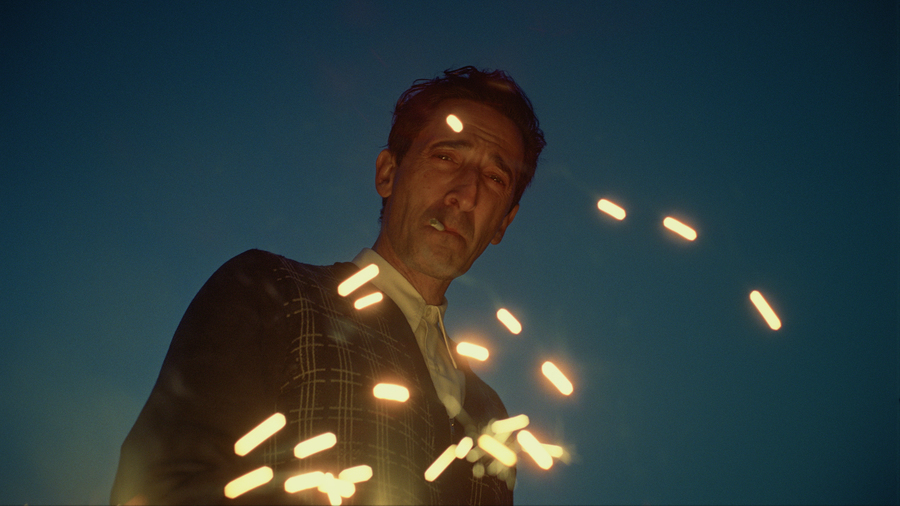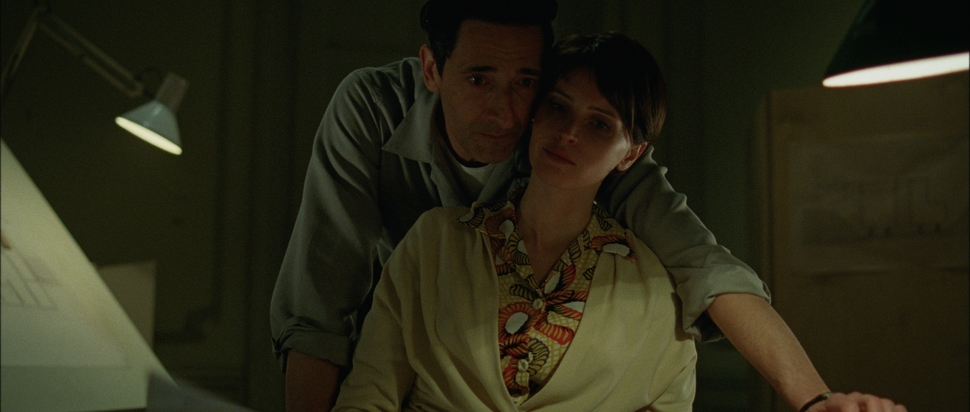The Brutalist director Brady Corbet is trying to save cinema
With his new film The Brutalist grabbing ten Oscar nominations and currently making a robust run in UK cinemas, we catch up with director Brady Corbet
Brady Corbet is in a buoyant mood. The 36-year-old American actor-turned-filmmaker is speaking to us over Zoom while supping tea in a London hotel. Our chat is one of a series of back-to-back short press interviews he’s doing following the first weekend of his monumental third feature The Brutalist, and the healthy UK box office results have him cheered. He also has a smile on his face because four days ago he received his first Academy Award nominations (for Best Director and Best Original Screenplay), with The Brutalist nominated in eight more categories, including Best Picture, Best Actor for Adrian Brody, Best Supporting Actress for Felicity Jones, and Best Supporting Actor for Guy Pearce.
“It's a wonderful boom for the movie,” says Corbet. “What's so amazing about things like [the Oscars] is that they really boost a film's box office potential. And for a film that's, you know, three hours and 40 minutes long and about a mid-century designer, we need all the help we can get.”
It certainly seems to have given his film some commercial swagger. In a robust first weekend on UK screens, The Brutalist made just over £700,000, despite playing in only 170 theatres. It expanded to more cinemas in its second week and so far made over £1.8 million. It’s a figure even more impressive considering its aforementioned length – which includes a 15-minute intermission – meaning cinemas are extremely limited in the number of screenings they can squeeze in per day.

Adrian Brody in The Brutalist. Image courtesy of Universal Pictures
The Brutalist’s ambitions are as hefty as its runtime. The epic, decades-spanning melodrama begins in 1947 and follows the travails of László Tóth (played by Brody), a Jewish Holocaust survivor and Bauhaus-trained architect from Hungary, as he tries to start a fresh life in America. His talent comes to the attention of tycoon industrialist Harrison Lee Van Buren (Pearce), who commissions László to build an extravagant public building dedicated to his late mother. But the construction of László’s daringly modern building does not run smoothly, and neither does the relationship between the genius architect and his wealthy patron.
It’s extremely tempting to read this story of an artist toiling to make his masterpiece as being analogous to The Brutalist’s own making. After all, movie-making, like architecture, is an art form that needs huge amounts of capital and manpower to make it happen.
Corbet agrees that there are similarities between both professions, but he doesn’t see The Brutalist as any more personal than his other two features. For example, he points to his polarising second film Vox Lux, a caustic cautionary tale of modern celebrity about a young woman who becomes a global pop star at 13 after surviving a school shooting. “Vox is personal too because when I was, oh, I guess, 12 or 13 years old, I started to become something of a public figure” explains Corbet, whose early acting career included lead roles in Thunderbirds and Mysterious Skin. “And look, I wasn't Taylor Swift or anything, but I still had to grow up in public; I knew what that felt like. Plus I saw a lot of people go through it and not handle it very well. So I think every film for me is imbued with my own personal sensibilities. [The Brutalist] just happens to be about the life of an artist.”
We’re not quite buying this answer, because there are other ways in which we can see parallels with László and Corbet. For one, they are both perfectionists who don’t seem to take no for an answer. Corbet’s insistence on shooting The Brutalist on VistaVision, an elaborate widescreen film format that’s been defunct in Hollywood filmmaking since the early 60s, for example, isn’t too different from László’s exacting demands to use pricey Italian marble in his building’s construction.
“You know, I'm very, very, very stubborn,” admits Corbet. “I'm never mean about it. I don't have a fiery temper or anything like that, but I'm not really ever willing to negotiate with terrorists.” The 'terrorists' in this case being the film financiers.
He also explains that despite the modest budgets he works with – $3 million for his debut Childhood of a Leader, $11 million for Vox Lux, just under £10 million for The Brutalist – shooting on film is more than manageable. “What I want to signal for the filmmaking community is that if I can do it, anyone can,” he says of his devotion to shooting on film. “And you know, for another filmmaker, it might be that that's not important to them. I'm not trying to tell people what to do. I just want to make sure that we never remove this very important tool from the box.”
As well as being an ardent champion of celluloid, Corbet is passionate about cinema itself. He describes himself as “a film viewer first, a filmmaker second”, and he seems excited not just by The Brutalist’s warm reception from audiences, but by what he sees as a general appetite in recent years for a more challenging and artful type of cinema. “In the past, I've never paid any attention to box office,” he says. “It's just not something that's very important to me; I'm usually not even updated about it by the distributor. But with this film, I was genuinely curious to see how it would perform, because I really yearn for a time when a movie like Midnight Cowboy or French Connection or The Godfather could be number one at the box office again.”
He reckons we might be living in that time, pointing to the success of Oppenheimer last year. “Of course I understand that Oppenheimer was made by Christopher Nolan, and there are a lot of movie stars in it, but still, for a film that's not science fiction, not a horror movie, not an action movie, a billion dollars is crazy. I also think about a film like The Zone of Interest making $52 million globally. That's incredibly exciting for the medium.”
Corbet sees plenty of artistry in his competitors in this year’s awards race too. “Whether people love or hate the crop of films this year at the Oscars, what's so exciting is that there are so many radical movies,” he says. “And I include a massive movie like Dune Two in that, which is just such an extraordinarily well-directed picture. And it’s pretty radical: it's got like 30 minutes of fucking black and white infrared – or, like, however they shot that – you know? That’s an incredible sequence. Or my friend Sean [Baker]'s movie, Anora. I'm just so excited that these are the movies that are a part of the conversation.
“I'm not super optimistic [about cinema's future] because I'm not an optimist," he continues, "but I'm more optimistic than I have been in a while. And it just gives me a little bit of strength, I suppose, to continue and not try and adapt the projects for what we think audiences want.”
This is not to say Corbet doesn’t care about his audience, though. After all, he did insist that every screening of The Brutalist had to include a 15-minute intermission for their comfort. “I mean, I could talk endlessly about why the film is bifurcated, and how the first half represents American optimism, and the second half is, you know, American pessimism, but really, I just wanted people to have a nice night out, and I think letting people spread their legs does a lot,” he explains.
“It allows people to not be uncomfortable physically in the second half of the movie, which was very important to me. I wanted people to be very focused, because the movie doesn't speed up. Rhythmically it's the same as the first half of the film by design. So I didn't want people to start losing patience when you're in a long sequence or shot."
He also reckons the intermission, and the run of special 70mm screenings they're planning (details in the footnote), adds to the communal experience of a night at the pictures. “It event-izes the experience of going to the movies,” explains Corbet, “and I think that's very important. That's an experience and a tradition that I think, especially after COVID, all of us were really scared we might never get back in quite the same way. So I really just hope that people are enjoying the experience.”
The Brutalist is released by Universal and is currently playing widely in cinemas across the UK & Ireland; the film screens in a special 70mm presentation at Glasgow Film Theatre from 14 to 25 Feb, tickets on sale now
Read our 5-star review of The Brutalist here
